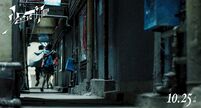Undoubtedly, the film "Youth as a Younger" released at the end of October gave a boost to the slightly tired Chinese film market in the fourth quarter, becoming an annual hit after "The Wandering Earth" and "Nezha". sparked widespread debate. A series of issues discussed in the film, such as school violence, native families, college entrance examination pressure, youth social interaction, and the beginning of adolescence, aroused the recognition and empathy of many fans.
The film tells that after classmate Hu Xiaodie committed suicide by jumping off the building, Chen Nian, a high school girl who dreamed of going to Beijing to go to school, also suffered school violence from Wei Lai and others. In desperation, Chen Nian called the police to expose the behavior of Wei Lai and others, which eventually led him to drop out of school, but he also suffered intensified revenge. By chance, Chen Nian and Xiaobei got acquainted with each other. In order to avoid Wei Lai's intrusion, she asked Xiaobei to protect herself in secret, but Chen Nian was severely injured by Wei Lai in an accident. Afterwards, Wei Lai felt remorse, but was accidentally killed by Chen Nian, at a time when the college entrance examination was imminent. Xiaobei assisted Chen Nian in disposing of the corpse, set up a bureau, and voluntarily assumed the responsibility, but Chen Nian finally couldn't stand the inner condemnation and chose to surrender.
In the movie, on the one hand, it is shown that in the whole "bullying" system, two marginalized people finally achieve mutual recognition: whether they study hard or mix society, they have to be oppressed by the law of the jungle; on the other hand It is, after reaching a consensus on this confrontation, how to eliminate the identity boundary and become a "juvenile" that cannot be generalized by labels. Director Tsang Kwok-cheung from Hong Kong appropriately demonstrated his personal characteristics in this film. The large-scale handheld photography, close-up of the actor's face, and various ingenious transition montages made fans hooked.
It has to be said that the filming method adopted by the director is extremely bold: a large number of close-ups of the face, and the way of shooting the camera on the actor's face is a great challenge for the actor. Seriously, the whole movie falls apart. Fortunately, under the continuous running-in and polishing of the two leading actors and the director, the degree of completion is not bad. Under the guidance of this way of shooting, when I look at the faces of these characters, on the one hand, what I receive most directly is indeed the emotion of the characters, but on the other hand, the way this emotion is given will be affected by the close-up. The restrictions are almost "transparent". In other words, it is too straightforward and superficial, giving the audience the simplest emotional impact, and less possibility of instantaneous jumps and flows between the characters' emotions. Thus, a perceptual expanse is missing.
It is true that I fully agree that bullying is a serious problem in schools, but if a movie generally produces a very one-way emotional experience after the audience has watched it, then I don't think it can be considered a success, except for the atmosphere. Beyond construction, is it possible to reach a more complex level? Does the close-up reinforce this emotional identification, which in turn allows us to somehow ignore other, more critical issues? This is worth thinking about, the pros and cons of this approach.
While the movie has received widespread attention from the society, it has also brought many controversies such as plagiarism and fusion of the original work. There are also many problems, big or small, but there is no doubt that this film is one of the most popular domestic theatrical films this year. There is a better existence, and I hope that the Chinese film market will produce more such films that are truly worthy of people's thinking and discussion in the future.
View more about Better Days reviews











